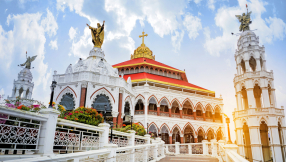Pastor politicians campaign for Colombia's next president
Church leaders from Misión Carismática Internacional (MCI), one of the fastest growing churches in the world, are supporting former Defence Minister, Dr Juan Manual Santos, to replace his former boss President Álvaro Uribe.
Santos has played a key role in bringing peace to Colombia and defeating the FARC terrorist group. He was behind the audacious rescue operation which liberated French-Colombian politician, Ingrid Betancourt and fourteen other hostages including three Americans, in July 2008.
Widely viewed as a shoo-in, Santos faces a much bigger fight than expected. In a race which has tightened dramatically over the past two months, Antanas Mockus, candidate of the newly formed Green Party, has seen his support soar.
According to Colombian news magazine Semana, an April survey gave the former dean of the National University of Bogotá and two-time mayor of Bogotá 38% of the vote, up from 9% one month earlier. He would find governing difficult if he were to win the election as his party only has five seats in the Senate.
In national elections held on March 14, leaders from MCI church were elected at all levels of government for the centre-right ‘U’ party (National Unity Party), led by Santos.
Claudia Wilches, was one of 28 ‘U’ candidates sent to the 102-seat Senate. Luis Barrios was re-elected to Congress to represent the Bogotá region with more than 22,000 votes. Luisa del Rio, won a seat in the Andean Parliament based in Bogotá, established to serve Bolivar, Peru, Ecuador and Colombia.
The church also has three leaders in the 45-member Council of Bogotá, following the local elections of 2007, which together with the Mayor, is responsible for governing the city of 7 million people.
These pastor-politicians of MCI are now actively campaigning for Santos, seeking to rally their supporters behind him.
Santos has visited MCI’s 16,000 seat convention centre three times this year, attending their annual conference in January. Widely supported by the media, Mockus is in favour of legalising abortion and gay marriage, measures Santos has vowed to oppose.
The political involvement of Christian leaders has been pioneered by Claudia Castellanos, one of MCI’s founding pastors. First elected to the Senate in 1989 for the National Christian Party, she witnessed up close the struggle for Colombia’s future, as drug lord Pablo Escobar waged war against the government. Taking the nation to the brink of collapse, he was killed in 1993 by Colombia special forces, bringing an end to the drug cartel’s grip over the nation.
In 2000, Castellanos ran for Mayor of Bogotá, coming third with 198,000 votes. She was appointed by President Uribe as Colombia’s Ambassador to Brazil in 2004, and was re-elected to the Senate in 2006. In March, she did not seek re-election but stood aside to make way for her assistant and former Senator, Wilches.
MCI has had a vision to see Colombia transformed through the gospel since it was founded in 1983 with eight people. By following the example of Jesus, of training twelve disciples to also make disciples, senior pastors César and Claudia Castellanos have seen the church grow to more than 200,000 members today.
Pastor César developed ‘The Ladder of Success,’ four steps of winning, consolidating, discipling and sending, to help train his disciples. This strategy of focussing on twelve leaders has become known around the world as the G12 vision, leading The Wall Street Journal to report that, "The Wharton business school couldn't have designed a better growth strategy."
With more than 200 MCI churches across Colombia, this grassroots Christian movement has strongly supported President Uribe, who has visited the church each year since 2002.
Under Uribe, Colombia has undergone a radical transformation. Once known as the drug capital of the world and struggling to defeat leftist guerillas, Uribe ushered in a new era of peace and stability.
Over the past eight years, Colombia’s kidnapping rate has fallen 90%, the economy has soared, cruise ships have returned to its Caribbean coast line and the colonial city of Cartagena, a UNESCO heritage site, hosts an international literary fair. The Colombian tourism board highlights these changes with the slogan, ‘The only risk is wanting to stay.’
With nine candidates on the list, opinion polls suggest that Santos and Mockus will be forced into a run-off – the result of which is too close to call.













